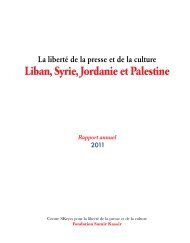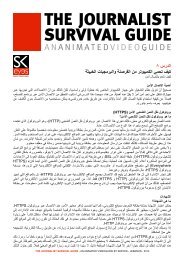JOURNALISTS' SECURITY IN WAR ZONES LESSONS FROM SYRIA
JOURNALISTS' SECURITY IN WAR ZONES LESSONS FROM SYRIA
JOURNALISTS' SECURITY IN WAR ZONES LESSONS FROM SYRIA
Create successful ePaper yourself
Turn your PDF publications into a flip-book with our unique Google optimized e-Paper software.
IntroductionAdditionally, there is the more common issue ofthe well-intentioned but inexperienced freelancerswith an ambition to break into journalism or toexpand their profile. These individuals are oftenprimarily motivated by having content publishedand generally are not overly concerned aboutsalary or conditions of work. In an industry facingmajor financial difficulties, it can be very temptingfor news outlets to pay low rates for contentacquired. However, this comes with a multitudeof implications, including that of driving moreexperienced journalists towards better paidprofessions and causing the freelancers to cutcorners on important elements such as preparation,training and equipment. This can, in turn, increasethe security risks for both the freelancers and thepeople they are dealing with in the war zone. Thissubject will be looked at in the section entitled“Dealing with Employers”. What should be keptin mind at this point is that the challenges facedby journalists and commissioning news editorsare vast and that the quality of news reportingwill inevitably suffer further if both groups failto adapt to the implications of a rapidly-evolvingshift in information gathering and news dispersal.Editors’ dilemmaIt should be noted that some media outlets arerefusing to accept content from freelancers or, morespecifically, freelancers who have not undergonebasic first aid or security training. The UKSunday Times famously refused to take copy fromfreelancers following the death of their veteranwar correspondent Marie Colvin, who was killedwhile reporting from Homs in February 2012.The Sunday Times reasoned that doing so wouldencourage others to take “exceptional risks.” (5)Other outlets, such as Radio France and themajor British broadsheets have adopted a similarpolicy. (6) Nevertheless, the practice is controversial,and many freelancers have expressed their criticismof such a stance saying that it should be up to themto decide whether the risks are worth taking andthat the implementation of such policies preventsimportant stories from being told.But, while the jury is still out when it comes tothe morality of accepting stories from freelancersreporting from conflict zones, there is a growingrealisation within the industry that concreteaction is needed to address such issues. In recentyears, a number of initiatives have been takento improve overall practice in an effort both tomaintain high standards while ensuring thatjournalists work responsibly and to high securitystandards. The Frontline Freelance Register, (7)for instance, is a body of freelancers whosemembers promise to adhere to a basic codeof conduct with a view to ensuring responsiblejournalism. Additionally, Frontline Club produceda white paper entitled “Newsgathering Safety andthe Welfare of Freelancers” (8) , which outlines someof the most significant issues faced by freelancers,including digital training and insurance problems.Meanwhile, press freedom organisations andjournalists’ unions are continuing their efforts toprovide journalists with advice and information,including on the most affordable insurance andsecurity training rates available to journalists.Discussion pointsThe Samir Kassir Foundation hosted this retreatfor journalists who have reported from Syria to addimpetus to these drives that aim at improving the5. See, for example, Gavin Rodgers, ‘Sunday Times tells freelancers not to submit photographs from Syria’, Press Gazette, 5 February2013. Available at http://www.pressgazette.co.uk/sunday-times-tells-freelances-not-submit-photographs-syria6. This includes the Guardian, Observer and the Independent.For more information, see http://www.pressgazette.co.uk/broadsheets-back-sunday-times-decision-decline-freelance-submissions-syria7. https://frontlinefreelance.org/8. ‘Newsgathering Safety and the Welfare of Freelancers,’ a white paper by the Frontline Club, 6 June 2013.Available at http://www.frontlineclub.com/wp-content/uploads/2013/06/Safety-Report_WEB.pdf9




